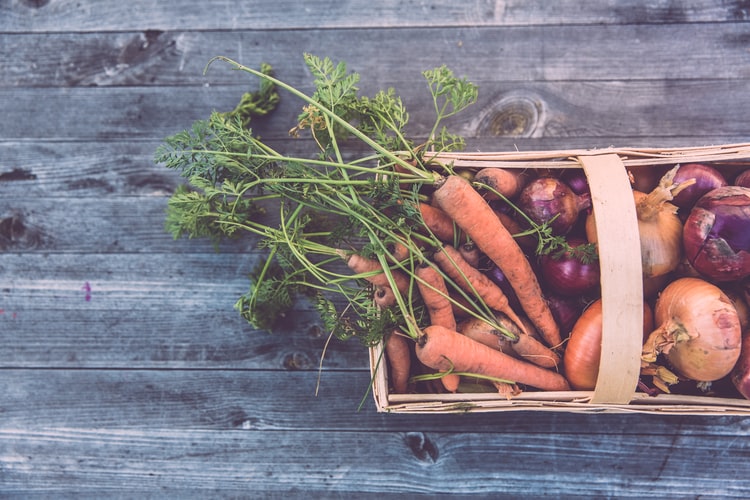un-pick-apart-able
“The nourishment of Cezanne’s awkward apples is in the tenderness and alertness they awaken inside us.”
― Jane Hirshfield
A small scratched hand is pulling ripe, red currants from a bush, plucking generational knowing, while the child is chitter-chattering in the warm evening air, gritting the nutty seeds between molars, brushing an ant off a sunburnt elbow. The bucket is full to the brim with berries the neighbors did not want. Tomorrow morning, these berries will go on yogurt.
This piece is not about the importance of eating organic food, local farming, and slow-food recipes. Nor is it about the damage done in the name of consumer culture. I am assuming that, by now, those topics are givens, and that if you are reading this, you have noticed that there is a distinct possibility that no matter how much we recycle and buy organic, there is a good chance that the human species may not make it through the coming climate changes. You may have also noticed that cultural/political fissures may kill us first. You may have children in your life and find yourself longing for a magical time-bridge that would deliver them safely to the other side of the heavy shakedowns of coming years. The instinct to provide a world of future life and love is strong. But is it stronger than the idea that tomorrow will be like today? Ironically, the possibility of continuing generations requires discontinuing current ways of living.
There is salt ahead. Stinging and necessary.
Staving off numbness and the scurvy of disconnectedness.
There are whole grains, fermented ideas, intoxicating and nostalgic.
The past is as lovely as it is deadly. Take small sips.
Add logic and enchantment to taste.
In the everyday gesture of a parent providing breakfast for a child, the entire future of humanity, and of thousands of other organisms, pivots. Like other animals, the human species is tasked with feeding the next generations. Life is dependent upon this seemingly simple mandate of continuance. Feed the babies. Don’t fail.
Bringing a morsel of food to your lips or to the lips of another is an act of intimacy. It is a personal contact point with the seasons and the generations. The tiny act of sharing a meal connects our intestines to the rainfall, and the strength in our muscles to the recipes of grandparents. The weaving of baskets to carry the harvest is sewn into the engineering of farm tools as well as the patience for and knowing of the land. Food is not made of nutritional measurement, it is made of intimate relationships. My sister once said:
“Human beings do not eat nutrients, they eat food.” – Mary Catherine Bateson
It is in this intimacy, I suggest, that lies a possibility for system change. The big picture—world saving, global activism and so on—all of that is important too. But the ability to perceive the vital complexity of each interaction in a day is the conceptual shift that makes substantive cultural change possible. That shift is accessed through the most personal unions with the world around us.
Sex is one such union with the complexity of our bodies coming together in communication*. Like sex, food is a medium through which the life in the external world becomes internal communing, for better and for worse.
It is what was normal. It smelled like home. Loved and broken.
The cinnamon of expectation, family bickering in the kitchen.
The bark of trees, the barking dog,
The perfect table, the gathering, the tarragon cadence of relatives,
Half way connecting to each other through the feast and retelling stories,
Half way disconnecting in slicing comments and garnishes of dominance.
Peppered in debt, not just to credit cards
Debt against our selves.
The flatware clinks.
The elders sigh and do not say things that need saying.
Still stewing.
(NB)
The contexts of personal history, media, genes, religion are just a few of the many influences that make people prefer particular flavors, temperatures, and times of day. The sauce of that meaning-making is aged and un-pick-apart-able.
When non-verbal realms of the body interface with culture, politics, economy, medicine, the arts, and history there is a transcontextual mingling of meanings…all in a single meal. Of course, it is impossible to achieve clarity on what meanings are made in that murky mixing of territories. But, in lieu of clarity, caution and care toward more contextual sensitivity is a big step toward living in a new way. And it is clear that the whole mess, from memories and textures to conversations and emotions becomes integral to well-being.
Emergence is the term that is used to capture this complex vitality of blurry relational possibility. It is what happens when countless streams of interaction come together and become a genesis. Emergence is a treasured source of possibility in this era, gilded by the new age, and imported into organizational management as the next “it” thing. But emergency is also emergence.
Food security is an emergency. Inability to feed babies for any reason is an emergency. And, in emergencies, it becomes dramatically difficult to keep the romance for emergence alive. The lens of perceived possibilities slams shut and starts spinning out binaries of us and them, this or that, live or die. In crisis moments, perception of relational and interrelational processes becomes seemingly gratuitous, and only the practical is given legitimacy.
In this era of ecological and cultural upheaval, it is becoming routine for government agencies and humanitarian organizations to anticipate big floods, earthquakes, wars, droughts, or fires that interrupt supply chains and agricultural production. The need to feed starving people can and is quickly translated by experts into the rapid delivery of a million food-pods with calculated nutritional benefits.
The rest of the interdependencies vaporize under the justification of addressing urgency. But short-circuiting complex systems is never the best plan. The consequences, and consequences of consequences, will continue to make themselves known.
Again, food is made of relationships. It would follow that to provide food, even in emergency situations, is to support the relationships through which food emerges. Feeding the babies is an act of love that is as necessary for children’s parents or guardians as it is for the children. The nourishment of food and water is imperative, and right behind that is the relational field of nourishment.
So, when you hold
the hemisphere
of a cut lemon
above your plate,
you spill
a universe of gold,
a
yellow goblet
of miracles,
a fragrant nipple
of the earth’s breast,
a ray of light that was made fruit,
the minute fire of a planet.–Pablo Neruda
Communing and Consuming
Every morning around the world, billions of breakfasts are prepared, served, and shared. There is so much for breakfast: pickled fish, or boxed cereal and toast, or rice and pork, or cappuccino and pastries, or eggs, or avocados, or noodle soups, or smoothies, or chia porridge. People with sleepy eyes open refrigerators each morning. They put on tea kettles and swallow up their meal. In doing so, the interdependent systems of our world are extended into another day.
But there is a double bind at the breakfast table. Right now, this extension of business as usual into each day is stepping ever closer to environmental, cultural, and economic suicide. On the one hand, in order to survive, we must feed our children breakfast. But, on the other, in order to feed our children, it is necessary to participate in systems that are inherently deadly.
We are going to have to pull back from all forms of exploitation to protect the possibility of breakfast for the babies. In that statement is the imperative for clean oceans, for gender equality, for protection of the forests, for human rights, and to end both poverty and wealth. What will it take to provide a world in which it is possible to feed the babies, where the soil is teeming with microorganisms that meet happily with their associates in the intestines of breakfast eaters—where the people who harvested the grains can also feed their babies?
It will take failure, and betrayal in equal measure—blended until smooth, then poured over the top of marinated remorse, and baked at high temperatures until the glamorous memories of this era of havingness melt in your mouth and the assumptions of global economies are digested by time. (NB)
I was stunned recently to learn the etymology of the word “consume”:
consume (v.)
late 14c., “to destroy by separating into parts which cannot be reunited, as by burning or eating,” hence “destroy the substance of, annihilate,” from Old French consumer “to consume” (12c.) and directly from Latin consumere “to use up, eat, waste,” from assimilated form of com-, here probably an intensive prefix (see com-), + sumere “to take,” from sub- “under” (see sub-) + emere “to buy, take” (from PIE root *em- “to take, distribute”).
Specifically, “to destroy by use, wear out by applying to its natural or intended use” from c. 1400. Sense of “to engage the full attention and energy of” is from 1570s.
I was surprised to see that the term consume was not more oriented around swallowing, taking in, or absorbing. But, when I was first told of this etymology I could not help but think: no wonder.
Supporting the Support: Warm Data
The way of thinking, perceiving, and conceptualizing that ‘consumes’—breaks the world into pieces, separating the necessary connections—provides the illusion of objectification. To perceive any aspect of a living system as objectified is a dangerous business that rapidly becomes exploitation. And here we are in a tapestry of cut connections.
So what then might the opposite of consume be? I might have suggested, fasting, ‘getting rid of’, or a form of austerity. But the definition, “destruction by separating into parts”, is all too appropriate, so the opposite must be something like ‘reassembling toward life.’
The question then, at the breakfast table, is how to support the relationships that together provide the morning meal? How to support the support of food. I need a strong coffee before I start playing with second-order questions like that. Starting with the description of food as relational, it is possible to begin to imagine some of the contextual processes of which food is a consequence. To do this is to notice what I would call warm data, the contextual relational information. It is not enough to simply list the various sectors of socio-economic structure that are needed to provide food and stream them together in hopes of gaining understanding of context. That information may be productive for some projects, but to get at the warm data is to look for the relationships between the contexts… the connective tissue. Often, this kind of information is not measurable, or repeatable, and it certainly is not “objective.” The observer matters.* (For more information on Warm Data, see my article by that name.)
Warm Data Toggle
Between these few contexts, the relational information begins to zoom in and out.
/The glorious lavishing affection of life’s bounty spread across a table in steaming dishes, flavors, and dimensions of farm to table vegetables, succulent fruits, aged cheeses, fresh breads, and smooth creams.
/800 million people will go to bed hungry tonight.
/The lettuce in the supermarket across the street from where I live in Stockholm has never seen sunshine or soil.
/As the climate changes, sixth generation farmers in Spain who grow tomatoes will not be able to continue their crops. Should they move to new land or new jobs?
/Food-related illness including diabetes, obesity, eating disorders, and others are rising globally at alarming rates.
/The recent heat waves left livestock owners struggling to feed their animals. Suddenly there was a lot of meat to sell.
/My children saw the movie Holes in which onions were eaten by the kids to protect them from poison lizards. They love onions to this day.
***
Transcontextual breakfast is made up of the relationship between the generations and the culture, the soil, the bacteria, the family, the agriculture, the economy, the market, the body, history, technology, and the bodies of the diners. There are many more contexts. There are always more. The way in which these contexts resonate with each other is what is interesting. Food is there, in the in-between, in the relations. To imagine a future world in which there is breakfast for the babies is to imagine that these relational processes are supported—or at the very least, not disrupted.
This is not a sterile project. To support and build relational health within living systems requires peripheral vision, actions that are indirect, and wide-angle observation that catches not just the result, but also the rhythm, the emotion, and the warmth. It is called Warm Data because it is information that has its relational nest included.
Food pods fortified with vitamins and minerals are what happens when the relational nature of food is not noticed. They may be necessary to stave off death, but caution is advised around what sort of consequences will “emerge.” It is just that sort of short-cut-severed-from-complexity thinking that got us here to begin with. There are damages to the fabric of the community when mothers and fathers do not dish out warm food to their children. Even in the eye of the storm, it is a good habit to notice and respect the way food knits together a community. Modern living has done vast harm to these processes and relationships, but they are not gone, only reorganized. Look carefully. There is poetry in breakfast. It is a vital ingredient.
Breakfast is the agriculture of growing grains and fruits. It is the industry of meats and processed foods. The distribution and sales of food products make up vast economic systems that reach around the globe. The pesticides used to grow the grains are ruining the soil and form an industry of chemical research, development, marketing, and sales. The labor violations of coffee and tea plantations are poured into cozy morning wake-up cups. The fish that are served carry the toxicity of modern oceans. The tankers, trucks, and factories that produce and package our morning sustenance are degrading the atmosphere. The animals that provide the dairy and meat are pumped with hormones and treated with disgusting cruelty. My clothing is made by women knee-deep in carcinogenic dye 16 hours a day. Everything my eye falls upon in my living room is made possible by exploitation. I cannot put any of it back.
I cannot fix it. But I had better not deny it. No matter the difficulty, I welcome the tangled mess; bring it forward into my perception. Let me grasp it with as much contextual and transcontextual description as I can muster. To welcome the complexity now is to meet it, to know it is bigger than originally anticipated and coming faster than the experts predicted.
When the emergencies emerge, and they will—they are already coming—I hope I will remember that the relational response is the one that is harder, more expensive, and takes longer. I will not shy away from the trouble it takes to heal from the inside out. Responding to food emergency with emergence requires attending to the many relational processes that result in a future in which babies can be fed. That is the opposite of the word “consume.”
Eating roots grown swoll
inside the soil
Drawing on life of living
clustered points of light spun
out of space
hidden in the grape.
Eating each other’s seed
eating
ah, each other.
Kissing the lover in the mouth of bread:
lip to lip.
– From ‘Song of the Taste’ by Gary Snyder
- In the fall of 2018, MIT JoDS will be publishing an article about complexity and consent by Nora Bateson entitled “I Want You to Want Me to Want You.”
References
Bateson, Mary Catherine. Peripheral Visions: Learning along the Way. New York: HarperCollins Publishers, 1994.
Bateson, Nora. Small Arcs of Larger Circles: Framing through Other Patterns. Place of Publication Not Identified: Triarchy Pr, 2016.
Bateson, Nora, Warm Data, Medium, 2017 https://hackernoon.com/warm-data-9f0fcd2a828c
Neruda, Pablo, Fernando Alegria, and Carlos Lozano. The Elementary Odes. New York: Gaetano Massa-Cocce, 1961.
https://www.etymonline.com/word/consume
Snyder, Gary. Regarding Wave. London: Fulcrum Press, 1972.
Building Resilience for Peace and Food Security, The State of Food Security and Nutrition in The World. http://www.fao.org/3/a-I7695e.pdf
Rosenthal, E. In Spain, Water Is a New Battleground. New York Times. https://www.nytimes.com/2008/06/03/world/europe/03dry.html [Accessed 15 Aug. 2018].







Thank you Kosmos… and may we all be dedicated to a world in which the babies will be fed beautiful morsels of care.
The article by Nora Bateson, un-pick-apart-able, is insightful, intelligent, artistic and frames our current problems regarding how we feed ourselves on this planet in a way that takes my breath away. Thank you so much
Jillblone, Thank you. I am glad you enjoyed the article. I hope to bring systemic cognitive sens making into more sensual, immediate realms of being alive… feed the babies. It is just that close… and just that important.
Your sentence: “When non-verbal realms of the body interface with culture, politics, economy, medicine, the arts, and history ther is a transcontextual mingling of meanings…all in a single meal.” I am swimming in that soup as, I guess, we all are, and finding ways to taste, chew, swallow, take nourishment from it. Lots to be with. It will take me time to read and re-read this article. So thanks.
thank you for noticing…